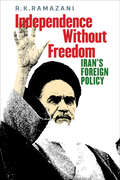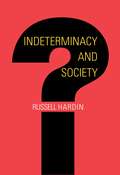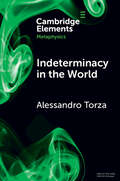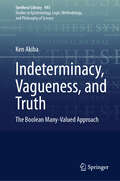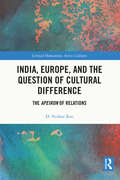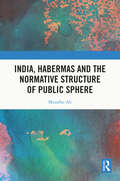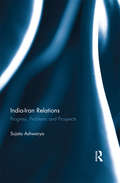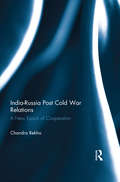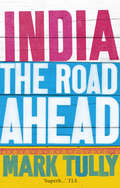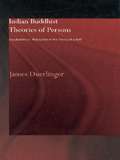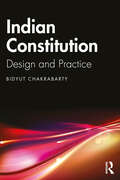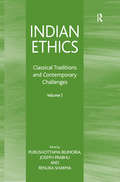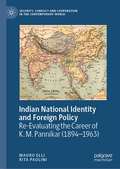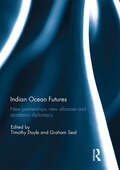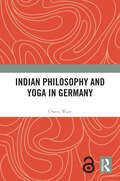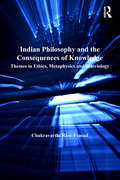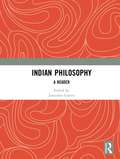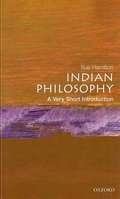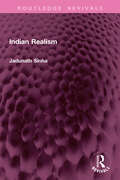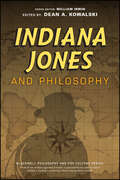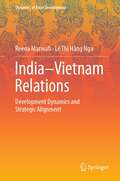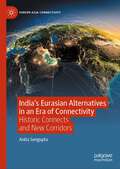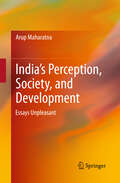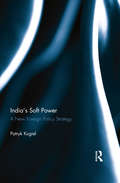- Table View
- List View
Independence without Freedom: Iran's Foreign Policy
by R. K. RamazaniRuhi Ramazani is widely considered the dean of Iranian foreign policy study, having spent the past sixty years studying and writing about the country's international relations. In Independence without Freedom, Ramazani draws together twenty of his most insightful and important articles and book chapters, with a new introduction and afterword, which taken together offer compelling evidence that the United States and Iran will not go to war.The volume’s introduction outlines the origins of Ramazani’s early interest in Iran’s international role, which can be traced to the crushing effects of World War II on the country and Iran’s historic decision to free its oil industry from the British Empire. In the afterword, he discusses the reasons behind America’s poor understanding of Iranian foreign policy, articulates the fundamentals of his own approach to the study of Iran—including the nuclear dispute—and describes the major instruments behind Iran’s foreign efforts. Independence without Freedom will serve as a crucial resource for anyone interested in the factors and forces that drive Iranian behavior in world politics.
Indeterminacy and Society
by Russell HardinIn simple action theory, when people choose between courses of action, they know what the outcome will be. When an individual is making a choice "against nature," such as switching on a light, that assumption may hold true. But in strategic interaction outcomes, indeterminacy is pervasive and often intractable. Whether one is choosing for oneself or making a choice about a policy matter, it is usually possible only to make a guess about the outcome, one based on anticipating what other actors will do. In this book Russell Hardin asserts, in his characteristically clear and uncompromising prose, "Indeterminacy in contexts of strategic interaction . . . Is an issue that is constantly swept under the rug because it is often disruptive to pristine social theory. But the theory is fake: the indeterminacy is real." In the course of the book, Hardin thus outlines the various ways in which theorists from Hobbes to Rawls have gone wrong in denying or ignoring indeterminacy, and suggests how social theories would be enhanced--and how certain problems could be resolved effectively or successfully--if they assumed from the beginning that indeterminacy was the normal state of affairs, not the exception. Representing a bold challenge to widely held theoretical assumptions and habits of thought, Indeterminacy and Society will be debated across a range of fields including politics, law, philosophy, economics, and business management.
Indeterminacy in the World (Elements in Metaphysics)
by Alessandro TorzaThe way we represent the world in thought and language is shot through with indeterminacy: we speak of red apples and yellow apples without thereby committing to any sharp cutoff between the application of the predicate 'red' and of the predicate 'yellow'. But can reality itself be indeterminate? In other words, can indeterminacy originate in the mind-independent world, and not only in our representations? If so, can the phenomenon also arise at the microscopic scale of fundamental physics? Section 1 of this Element provides a brief overview of the question of indeterminacy. Section 2 discusses the thesis that the world is comprised of indeterminate objects, whereas Section 3 focuses on the thesis that there are indeterminate states of affairs. Finally, Section 4 is devoted to the case study of indeterminacy in quantum physics.
Indeterminacy, Vagueness, and Truth: The Boolean Many-Valued Approach (Synthese Library #493)
by Ken AkibaThis book shows that the assumption that classical logic is essentially a bivalent (i.e., 2-valued) logic, a logic of truth and falsity, is an incorrect and harmful conception. Classical logic is certainly a Boolean logic, and the smallest (non-degenerate) Boolean algebra is the 2-element Boolean algebra; however, there are numerous Boolean algebras that have more than 2 elements, such as the 4-, 8-, 16-, ..., infinite-element Boolean algebra, and they all work equally well for the semantics of classical logic. Contrary to the popular thought, there is such a thing as classical (or Boolean) many-valued logic. The book applies this logic to solve such philosophical problems as the Fission Problem for personal identity, the Sorites Paradox, and the Liar Paradox. All these problems concern situations that involve indeterminacy or vagueness, situations where there seems 'no fact of the matter' that makes the relevant sentences true or false, thus requiring truth value gaps between truth and falsity. Because of that, classical logic has been thought to be an inadequate tool to deal with the problems. This book, however, offers solutions to those problems by retaining classical logic but assigning intermediate Boolean values to the relevant sentences. The book is of great value to researchers and graduate students in philosophy, especially for those who are interested in the philosophical issues surrounding indeterminacy, vagueness, and truth.
India, Europe and the Question of Cultural Difference: The Apeiron of Relations (Critical Humanities Across Cultures)
by D. Venkat RaoThis volume critically engages with the question of cultural difference and the idea of living with diversity in the context of India and Europe. It looks at certain essential European categories of learning such as art, nature, human, literature, relation, philosophy, and the humanities and analyses texts from Sanskrit language (through Telugu resources) to argue that categories like prakriti, loka, jati, dharma, karma, sahitya, kala,etc. cannot be conflated with conceptual formations such as nature, world, caste, religion, (sanctioned) action, literature and art respectively. The book questions and unravels the efficacy of European concepts, theories and interpretive frames in understanding Indian reflective traditions and cultural forms. It also lays the groundwork for reorienting teaching and research in universities in the humanities on the basis of key cultural differences. By focusing on major themes in the humanities discourse and their limitations, the work engages with the writings of Heidegger, Derrida and Agamben, among others, from radically new vantage points of Sanskrit-Indian reflective traditions, and challenges prevailing ideas about Indian art, literature and culture. Part of the Critical Humanities Across Cultures series, this book will be an essential read for scholars and researchers of Indian languages and literature, comparative literature, art and aesthetics, postcolonial studies, cultural and heritage studies, philosophy, political philosophy, comparative philosophy, Sanskrit studies, India studies, South Asian studies, Global South studies, and for those working on education in the humanities/human sciences.
India, Habermas and the Normative Structure of Public Sphere
by Muzaffar AliThis book examines how the contemporary Indian situation poses a strict theoretical challenge to Habermas’s theorization of the public sphere and employs the method of samvāda to critically analyse and dissect its universalist claims. It invites the reader to consider the possibility of imagining a normative Indian public sphere that is embedded in the Indian context—in a native and not nativist sense—to get past the derivative language of philosophical and political discourses prevalent within Indian academia. The book proposes that the dynamic cooperative space between Indian political theory and contemporary Indian philosophy is effectively suited to theorize the native idea of the Indian public sphere. It underlines the normative need for a natively theorized Indian public sphere to further the multilayered democratization of public spheres within diverse communities that constitute Indian society. The book will be a key read for contemporary studies in philosophy, political theory, sociology, postcolonial theory, history and media and communication studies.
India-Iran Relations: Progress, Problems and Prospects
by Sujata AshwaryaThis book examines India’s relationship with Iran since the post-World War II period and its unique search for meaningful bilateral ties in the West Asian region in the context of the changing regional and international scenarios. The four chapters highlight the achievements and constraints on the development of Indo-Iranian relations during the Cold War era; opportunities and limitations in bilateral engagements between India and Iran in the aftermath of the Cold War; impact of the ‘US factor’ on the development of crucial Indo-Iranian energy ties and the limitation imposed by India’s relations with Israel and Saudi Arabia on the India–Iran ties. More specifically, the four chapters touch on the central drivers—energy imports, access to Central Asia, cooperation in Afghanistan, mutual trade and economic investments and security ties—of India’s Iran policy, and how they structure India’s interaction with the other countries of the region and impact on the articulation of national interests. Combining a rich interplay of facts and figures with nuanced analyses, this volume will be a valuable resource for scholars, policymakers, diplomats and any interested reader desirous of knowing more about Indo-Iranian relations in particular and India’s West Asia policy in general. Please note: Taylor & Francis does not sell or distribute the Hardback in India, Pakistan, Nepal, Bhutan, Bangladesh and Sri Lanka
India-Russia Post Cold War Relations: A New Epoch of Cooperation
by Chandra RekhaPost Cold War international relations have undeniably been a litmus test for the bilateral relations between India and Russia. With the emergence of a new international system, the foreign policies of both countries vacillated to explore new avenues of partnerships with other international players, an opportunity that otherwise proved effective to a large extent. National priorities and the geo-political architecture remodelled by the US, thus, compelled New Delhi and Moscow to pursue a foreign policy that moved away from serving the interests of each other. While defining the trends in the bilateral relations between the two countries, the strategic community has questioned whether the relationship can remain as special and strategic as it had been in the past. Are both countries still as relevant to one another as they once were? <P><P>As the constant debate revolves around these questions, the two entities have, however, indicated a certain level of distinguishing characteristics in order to address the complexities and challenges in the partnership and have acknowledged that their relationship is not only special but also indispensable. What has also continued to remain undamaged and an integral part of the bilateral relations is mutual trust, understanding and concern, thus, resulting in maturity and pragmatism, irrespective of the uncertainties that the two countries face. It is in this context, that the new stage in the bilateral relations between the two countries requires a thorough assessment. It stands to reason that with the developments that are taking place in the current international milieu, there is a need for India and Russia to reemphasise their strong strategic partnership, goodwill and diplomatic trust that have stood the test of time. This book undertakes a serious assessment of the strategic partnership in the contemporary international set up. The seven chapters of the book attempt to address the myriad challenges through detailed analyses and evaluation of the partnership between India and Russia in various spheres, including the political, defence, economic, nuclear, energy, science and technology, security, and strategic engagement. <P><P>Please note: Taylor & Francis does not sell or distribute the Hardback in India, Pakistan, Nepal, Bhutan, Bangladesh and Sri Lanka
India: the road ahead
by Mark TullySince the Indian economy was liberated from bureaucratic, socialist controls in 1991, it has developed rapidly. A country once renowned for the backwardness of its industries, its commerce and its financial market is now viewed as potentially one of the major world economies of the twenty-first century. But there are many questions which need to be asked about the sustainability of this rapid economic growth and its effect on the stability of the country. Have the changes had any impact on the poor and marginalised? Can India's democracy contain the mounting resentment of those left out of the new economic order? Can a high growth rate be sustained with India's notoriously corrupt and inefficient governance? Can the development of its creaking infrastructure be speeded up? How is India going to feed itself unless agriculture is reformed?This timely book will answer these questions through interviews with industrialists and cricketers, God men and farmers, plutocrats and former untouchables. Full of fascinating stories of real people at a time of great change, it will be of interest to economists, business people, diplomats, politicians, as well as to those who love to travel and who take an interest in the rapid growth of one of the world's largest countries, and what this means to us in the West.
Indian Buddhist Theories of Persons: Vasubandhu's Refutation of the Theory of a Self (Routledge Critical Studies in Buddhism)
by James DuerlingerIn this book, Vasubandhu's classic work Refutation of the Theory of a Self is translated and provided with an introduction and commentary. The translation, the first into a modern Western language from the Sanskrit text, is intended for use by those who wish to begin a careful philosophical study of Indian Buddhist theories of persons. Special features of the introduction and commentary are their extensive explanations of the arguments for the theories of persons of Vasubandhu and the Pudgalavâdines, the Buddhist philosophers whose theory is the central target of Vasubandhu's refutation of the theory of a self.
Indian Constitution: Design and Practice
by Bidyut ChakrabartyThe book deals with the making and unfolding of the Constitution of India, framed by the Constituent Assembly between 1946 and 1949. Superseding the conventional legalistic approach, it focuses on the politico-ideological priorities of the members of Assembly who played a critical role in preparing the provisions of the Constitution.With its appeal cutting across academic specializations, this book stands out as a significant document by making readers aware of their constitutional rights and duties and the ways to utilize the constitutional directions for human and national betterment. Written in lucid language, this book is a great asset for those seeking to understand the complex ideas implicit in legally articulated provisions.Tailored to the academic requirements of a global readership, this volume would be useful to students, researchers and teachers working in the fields of Politics, Law, public administration and public policy. It would also be an invaluable resource for legal experts and policymakers.
Indian Ethics: Classical Traditions and Contemporary Challenges: Volume I
by Purushottama Bilimoria Renuka Sharma Joseph PrabhuIndian ethics is one of the great traditions of moral thought in world philosophy whose insights have influenced thinkers in early Greece, Europe, Asia, and the New World. This is the first such systematic study of the spectrum of moral reflections from India, engaging a critical cross-cultural perspective and attending to modern secular sensibilities. The volume explores the scope and limits of Indian ethical thinking, reflecting on the interpretation and application of its teachings and practices in the comparative and contemporary contexts. The chapters chart orthodox and heterodox debates, from early classical Hindu texts to Buddhist, Jaina, Yoga, and Gandhian ethics. The range of issues includes: life-values and virtues, karma and dharma, evil and suffering, renunciation and enlightenment; and extends to questions of human rights and justice, ecology and animal ethics, nonviolence and democracy. Ramifications for rethinking ethics in a postmodern and global era are also explored. Indian Ethics offers an invaluable resource for students of philosophy, religion, human sciences and cultural studies, and to those interested in South Asian responses to moral dilemmas in the postcolonial era.
Indian Knowledge System First Semester FYBA New NEP Syllabus - SPPU
by Dr Neeta Suresh Mohite Dr Dnyandev Laxman Nitve Dr Rupali Bipin Sheth Dr Manisha Deepak PuranikThe book "Indian Knowledge System" introduces students to India's ancient and diverse knowledge traditions as part of the National Education Policy (NEP) 2020 curriculum. It covers the evolution of scientific thought, contributions of scholars like Aryabhata and Varahamihira in astronomy, Ayurveda and Unani medicine, and advancements in metallurgy. The text also explores India's rich humanities, including languages like Sanskrit and Prakrit, various philosophical traditions, ancient education systems such as Takshashila and Nalanda, and architectural heritage, particularly temple architecture. The book aims to preserve, research, and integrate this traditional knowledge into modern education, emphasizing its scientific and cultural significance for contemporary learners.
Indian National Identity and Foreign Policy: Re-Evaluating the Career of K. M. Pannikar (1894–1963) (Security, Conflict and Cooperation in the Contemporary World)
by Mauro Elli Rita PaoliniShedding light on the role of India within twentieth-century international relations, this book explores the life and career of Kavalam Madhava (K. M.) Panikkar (1894–1963), an Indian historian, statesman and diplomat. Having been involved in Indian intellectual and political life throughout the transition from the British Empire to the Nehruvian era, Panikkar was an important figure in the evolution of the modern Indian state. Based on over four years of extensive research both in India and Europe, and the analysis of public writings and unpublished archival documents, this book examines Panikkar’s role in the Indian national movement, the governance of several Princely states, and India’s foreign policy, notably with China. Not only do the authors critically re-evaluate Panikkar’s intellectual and political thoughts, but also his influence on the broader issue of India’s path towards independence. Offering a valuable contribution to modern Indian diplomatic history and wider international relations, this comprehensive book emphasises Panikkar’s importance in shaping the modern idea of India and crucial elements of Indian foreign policy.
Indian Ocean Futures: New Partnerships, New Alliances, and Academic Diplomacy
by Graham Seal Timothy DoyleIndian Ocean studies, which once lagged behind studies of the Atlantic and the Pacific, is an important emerging academic field which has come into its own. In the next fifty years, the Indian Ocean Region will become very significant as a result of enormous demographic changes. What was the Ocean of the South is rapidly becoming the Ocean of the Centre, the Ocean of the Future. Curtin University, Western Australia, has a long and distinguished history of engagement with the Indian Ocean region and with Indian Ocean Studies, and its Australia-Asia-Pacific Institute of Curtin University continues to maintain a focus on the Indian Ocean -past, present and future. This book examines a number of themes emerging from its 2014 Conference entitled "Indian Ocean Futures", which attracted some of the best Indian Ocean region scholars. The conference connected humanities, social sciences and scientific disciplines; this book collects some of the preeminent works focused on geo-strategic, cultural, environmental security and human security themes. The book is also an important contribution to the building of academic diplomacy in the region – that is to say, it contributes to region-building by creating epistemic communities and networks between government, the private sector, and academia throughout the region. Through the pursuit of academic diplomacy, academics are capable of pursuing research goals which enhance governmental, business, and civil society objectives of the day. This book was previously published as a special issue of the Journal of the Indian Ocean Region.
Indian Philosophy and Yoga in Germany
by Owen WareThis book sheds new light on the fascinating – at times dark and at times hopeful – reception of classical Yoga philosophies in Germany during the nineteenth century. When debates over God, religion, and morality were at a boiling point in Europe, Sanskrit translations of classical Indian thought became available for the first time. Almost overnight India became the centre of a major controversy concerning the origins of western religious and intellectual culture. Working forward from this controversy, this book examines how early translations of works such as the Bhagavad Gītā and the Yoga Sūtras were caught in the crossfire of another debate concerning the rise of pantheism, as a doctrine that identifies God and nature. It shows how these theological concerns shaped the image of Indian thought in the work of Schlegel, Gunderrode, Humboldt, Hegel, Schelling, and others, lasting into the nineteenth century and beyond. Furthermore, this book explores how worries about the perceived nihilism of Yoga were addressed by key voices in the early twentieth century Indian Renaissance – notably Dasgupta, Radhakrishnan, and Bhattacharyya – who defended sophisticated counterreadings of their intellectual heritage during the colonial era. Written for non-specialists, Indian Philosophy and Yoga in Germany will be of interest to students and scholars working on nineteenth-century philosophy, Indian philosophy, comparative philosophy, Hindu studies, intellectual history, and religious history.
Indian Philosophy and the Consequences of Knowledge: Themes in Ethics, Metaphysics and Soteriology
by Chakravarthi Ram-PrasadThis book presents a collection of essays, setting out both the special concern of classical Indian thought and some of its potential contributions to global philosophy. It presents a number of key arguments made by different schools about this special concern: the way in which attainment of knowledge of reality transforms human nature in a fundamentally liberating way. It also looks in detail at two areas in contemporary global philosophy - the ethics of difference, and the metaphysics of consciousness - where this classical Indian commitment to the spiritually transformative power of knowledge can lead to critical insights, even for those who do not share its presuppositions. Close reading of technical Indian texts is combined with wide-ranging and often comparative analysis of philosophical issues to derive original arguments from the Indian material through an analytic method that is seldom mastered by philosophers of non-western traditions.
Indian Philosophy: A Reader
by Jonardon GaneriThe selection of essays in this volume aims to present Indian philosophy as an autonomous intellectual tradition, with its own internal dynamics, rhythms, techniques, problematics and approaches, and to show how the richness of this tradition has a vital role in a newly emerging global and international discipline of philosophy, one in which a diversity of traditions exchange ideas and grow through their interaction with one another. This new volume is an abridgement of the four-volume set, Indian Philosophy, published by Routledge in 2016. The selection of chapters was made in collaboration with the editors at Routledge. The purpose of this volume is to reintroduce the heritage of ‘Indian Philosophy’ to a contemporary readership by acquainting the reader with some of the core themes of Indian philosophy, such as the concept of philosophy, philosophy as a search for the self, Buddhist philosophy of mind, metaphysics, epistemology, language and logic.
Indian Philosophy: A Very Short Introduction
by Sue HamiltonIndia has a long, rich, and diverse tradition of philosophical thought, spanning some two and a half millennia and encompassing several major religious traditions. This Very Short Introduction emphasizes the diversity of Indian thought, and is structured around six schools which have achieved classic status. Sue Hamilton explores how the traditions have attempted to understand the nature of reality in terms of an inner or spiritual quest, and introduces distinctively Indian concepts such as karma and rebirth. She also shows how Indian thinkers have understood issues of reality and knowledge -- issues which are also an important part of the Western philosophical tradition.
Indian Realism (Routledge Revivals)
by Jadunath SinhaFirst published in 1938, Indian Realism is a reconstruction of the Yogacara Vijnanavada (Subjective Idealism) and an exhaustive criticism of it by the different schools of Indian realism. The exposition of the doctrine is based on the works of Santaraksita and Kamalasila and the critics of Vijnanavada. Generally each thinker’s exposition and criticism have been given separately. Profound thinkers like Kumarila, Jayanta Bhatta, Vacaspatimisra, Sridhara and Sankara have been included. There is a criticism of Vedanta by the Buddhist realists and the different schools of the Vedanta. Incidentally, the Yogacara subjectivism has been compared with the idealism of Berkeley and the sensationism of Hume. Parallel arguments of many contemporary realists, too, have been quoted to show that philosophical genius of a particular type is apt to move in the same groove, irrespective of its location. This book will be of interest to students of philosophy, religion and South Asian studies.
Indiana Jones and Philosophy: Why Did it Have to be Socrates? (The Blackwell Philosophy and Pop Culture Series)
by William IrwinINDIANA JONES AND PHILOSOPHY What does it mean to choose wisely? Can heroes seek fortune and glory? Why does Indy take a leap of faith? Do Indy’s adventures provide him evidence of the supernatural? Should we hide the Ark of the Covenant in a military-controlled warehouse? Why are museums so important to archaeology? If adventure has a name, it must be Indiana Jones! He’s both a mild-mannered archaeology professor and an intrepid adventurer traversing the globe in search of lost artifacts. Whether seeking the Ark of the Covenant in Egypt, the Sankara Stones in India, the Holy Grail in Turkey, or a mysterious crystal skull in Peru, Indy’s adventures never fail to delight audiences. Indiana Jones and Philosophy takes you on a whirlwind journey to investigate some of the most enduring questions about the human condition. You’ll read about how Indy has wronged Marion Ravenwood, how a virtuous person would make amends, the strides Indy makes to repair his relationship with his father, why Indy distinguishes fact from truth when he pursues archaeological treasures, and much more. With trusty guides such as Aristotle, Camus, Kant, and Nietzsche at your side, you’ll consider possible answers to these questions and see Indiana Jones in a whole new light! Comprehensive, immersive, and engaging, Indiana Jones and Philosophy offers you an accessible and lively opportunity to dive deeper into the world of Indiana Jones and appreciate the character’s greatness anew!
India–Vietnam Relations: Development Dynamics and Strategic Alignment (Dynamics of Asian Development)
by Reena Marwah Lê Thị Hằng NgaThis book provides an in-depth analysis of the close cultural links between India and Vietnam. It discusses the issues of trade negotiations under the Regional Comprehensive Economic Partnership (RCEP) and the Indo-Pacific construct. Issues such as strengthening the economic partnership, contemporary development challenges posed by the COVID-19 pandemic, including weakening supply chains, and geo-strategic tensions are explored in this book. It enriches understanding of the potential of the two countries to develop as manufacturing hubs for the region and beyond. Given the more aggressive posturing by China in 2020, the concluding chapter includes the policy prescriptions with a futuristic vision, for India and Vietnam to catalyze their strategic and bilateral partnership. Well researched and analytical, the book draws extensively from several interviews of experts, diplomats, journalists, businesspersons, and members of the diaspora. It is a must read for students, researchers, think tanks, area study centers, and all institutions engaged in Asian studies, encompassing narratives extending from the developmental to political, from the bilateral to the multilateral and from the geo-economic to the geo-strategic.
India’s Eurasian Alternatives in an Era of Connectivity: Historic Connects and New Corridors (Europe-Asia Connectivity)
by Anita SenguptaThe volume examines how in the twenty-first century narratives built around connectivity have become a structural component of international politics expanding into a wider array of policy fields i It examines the significance of this emerging narrative from an Indian perspective with particular reference to Eurasian alternatives. It argues that this represents the next stage of globalization and that an understanding of this is increasingly becoming crucial given the recent disruptions along with the emergence of a spate of new policies and institutions that could eventually lead to a new understanding of connectivity.
India’s Perception, Society, and Development: Essays Unpleasant
by Arup MaharatnaThere has been, of late, a growing realisation that the pace and pattern of economic development of a country can hardly be understood and explained comprehensively in terms of the straitjacket of economics discipline alone. India is a prime example of the importance of the part played by a country's history, culture, sociology, and socio-cultural-religious norms, values, and institutions in its development process. This book, with its assorted essays of varying depths of scholarship and insightful reflections, attempts to drive home this point more forcefully than ever before. In its search for the non-economic roots of India's overall sloth and murky progress in its broad-based economic and human development, the book illuminates major oddities deep inside a unique mental make-up full of perceptual and ideational dilemmas, many of which are arguably shaped by the long-lasting and dominant influence of what could be called the Brahminical lines of thinking and discourse. With India's hazy and dodgy world of perceptions as a backdrop, the book also addresses - through its intelligent essays - the deep and sometimes dire ramifications of the historic advent and the dramatic advance of neoliberal market ideology today.
India’s Soft Power: A New Foreign Policy Strategy
by Patryk KugielIt is sometimes said that, in the 21st century, the country that tells the better story wins, rather than the country whose army can prevail on the battlefield. That ability to attract others, persuade and set the agenda, soft power, plays an increasingly important role in international relations and in Indian foreign policy. However, while most of the rediscovered interest in India has been focused on its hard power attributes, such as its military and economy, this book concentrates on less tangible assets, such as its culture, ideas and people. The first comprehensive analysis of India’s soft power done from an international relations perspective, this book tracks the changes in Indian foreign policy over last two decades to show how soft power strategy, tools and institutions have been given a more prominent place in India’s external affairs. The study evaluates India’s soft power assets and liabilities and shows how the state is trying to make better use of this potential to realise its national interests. It assesses the effectiveness of India’s soft power approach and provides recommendations on possible improvements to make India a major smart power in the future. An intriguing and comprehensive analysis, it will be valuable for students and scholars interested in Indian foreign policy, soft power theory and international relations. Underlining India’s uniqueness, it substantiates the argument that soft power is not confined to the Western world. Thus, it contributes an interesting case study for comparative study of soft powers. Please note: Taylor & Francis does not sell or distribute the Hardback in India, Pakistan, Nepal, Bhutan, Bangladesh and Sri Lanka
